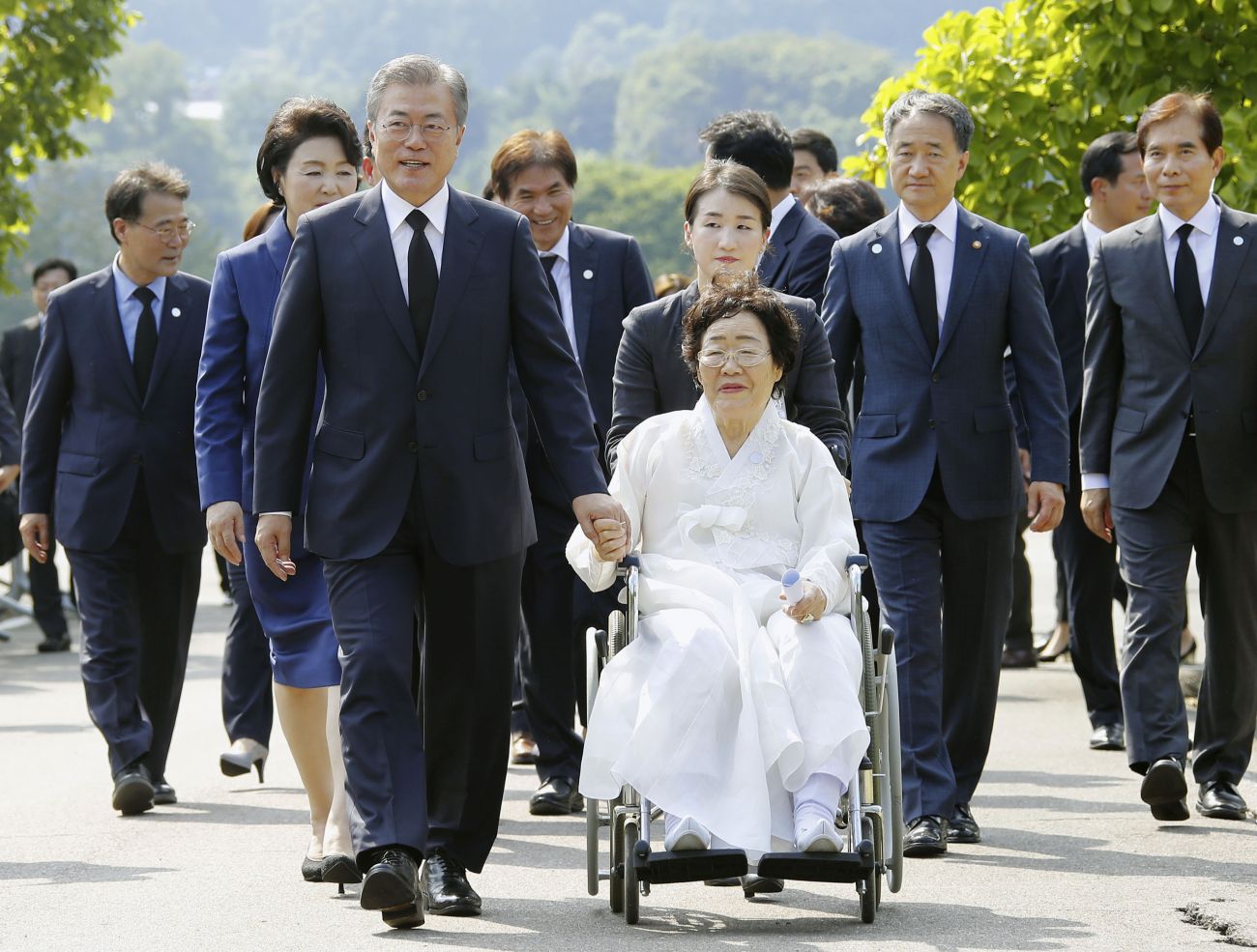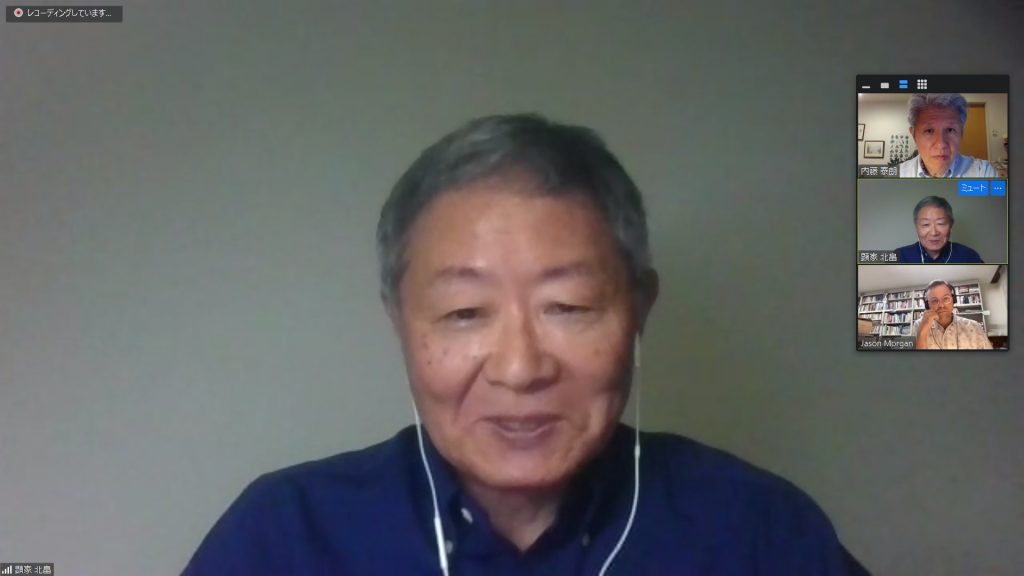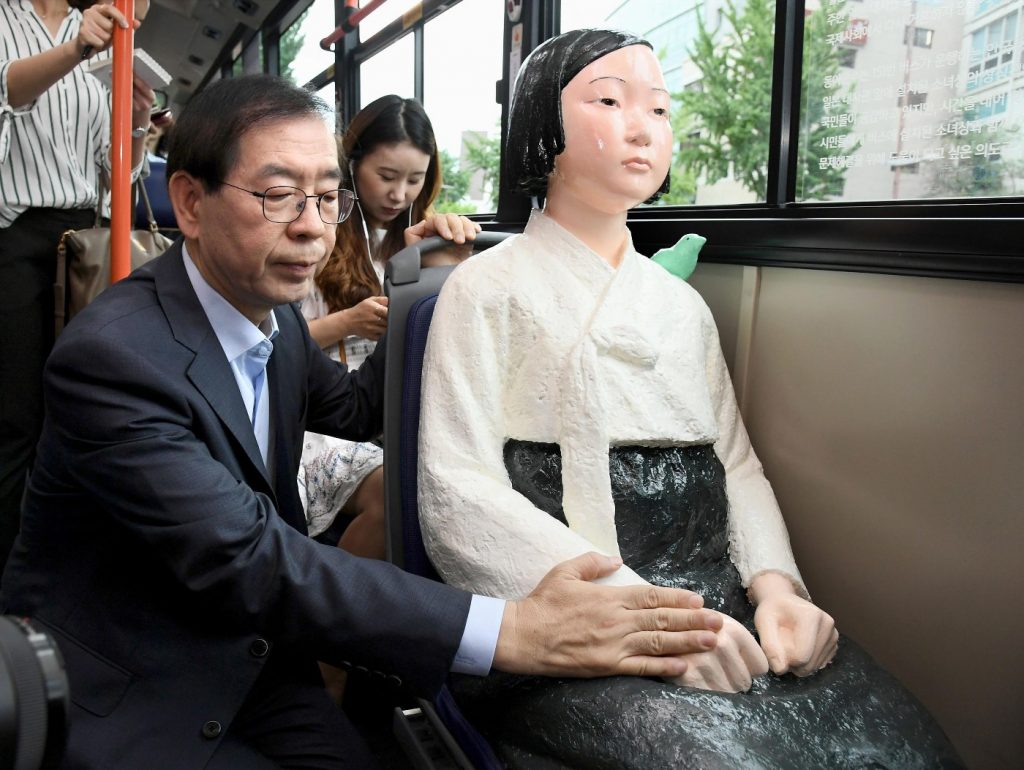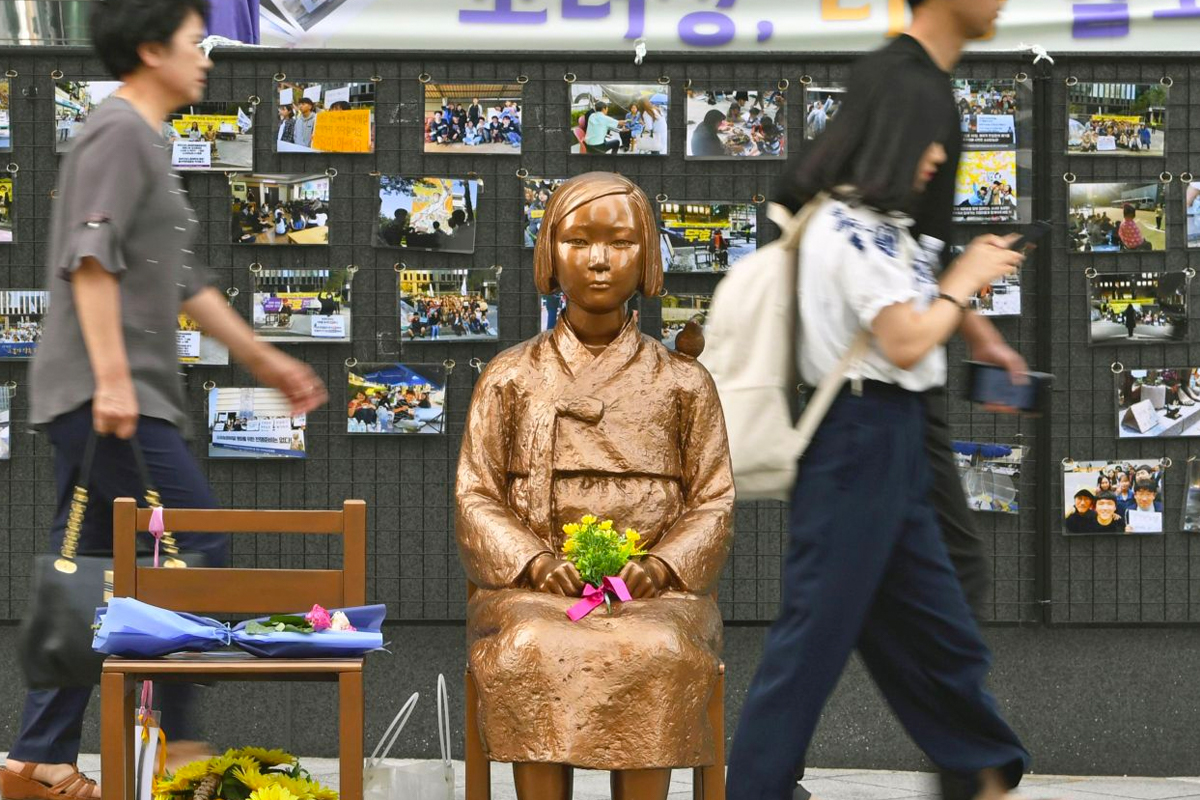CULTURE
Waseda Professor Offers Evidence of Comfort Women Working Under Contract. Now Come the Attacks
The critics’ aim is to intimidate public intellectuals through Nazi-like mob-attack tactics.

Published 1 month ago
on October 15, 2021
By Jason Morgan, Reitaku University
 South Korean President Moon Jae-in walks with a former comfort woman in August 14, 2018. The comfort women issue has been a major billboard issue in South Korean politics.
South Korean President Moon Jae-in walks with a former comfort woman in August 14, 2018. The comfort women issue has been a major billboard issue in South Korean politics.(First of 3 parts)
This is the first in a three-part series examining the significance of academic freedom and open debate. Readers may not interpret the facts or the arguments in the same way, but stifling debate leads to intense misunderstandings and explosive relations. This series is printed in the hope of promoting freedom of expression among our readers, in the academic environment, and beyond.
(Read Part 2 and Part 3)
 Interview with Professor Tetsuo Arima of Waseda University
Interview with Professor Tetsuo Arima of Waseda UniversityKnives Out for Professor Arima
The Zoom screen flickers to life and I can see the cherubic face of a late-middle-aged man. He looks serene, especially considering the circumstances. It is late at night, but he has agreed to an interview on short notice because over the past few dozen hours he has become the latest target of the bullying tactics roiling the American and South Korean academies.
The man on the Zoom screen is Tetsuo Arima. He is a full professor in the School of Social Sciences at the prestigious Waseda University in Tokyo. Professor Arima’s life as a scholar was upended on October 5, 2021, when a group of students in Japan calling themselves “Moving Beyond Hate” launched a change.org petition denouncing him.
Curiously, overseas professors who have been harassing Professor J. Mark Ramseyer quickly chimed in, calling Professor Arima “the shame of Waseda” and intimidating Professor Arima’s students and his employer.
Professor Arima is an expert in historical documents, especially the kinds of prewar documents in archaic and difficult Japanese which provide details about, for example, the comfort women. In July 2021, Professor Arima published All Comfort Women Made Contracts (WAC), in which he studies primary sources and other historical documentation. He concludes that the women working at comfort stations in Asia in World War II were almost all there on the basis of contractual agreement.
After Professor Arima’s book was published, a group of non-Japanese academics began complaining on Twitter about what Professor Arima wrote on the cover of his book — that, in trying to shut down free speech and academic inquiry, academics had been behaving “like modern-day Nazis.”
Now the online mob has their knives out for yet another historical researcher. As of this writing, the student group’s change.org petition has garnered more than 8,000 signatures. The petition calls for Professor Arima to be fired for “inciting discrimination” and “making repeated historical-denialist statements.”
The group is also demanding that Waseda “prevent a recurrence” of the crimes they charge Professor Arima with.
 Placed to encourage emotional responses to the issue rather than fact-based consideration, comfort Woman statues were placed on buses in Seoul.
Placed to encourage emotional responses to the issue rather than fact-based consideration, comfort Woman statues were placed on buses in Seoul.Attacks Targeting Emotion, Not Fact
During our interview, Professor Arima tells me that he has no idea who is behind the attacks on him. One thing seems certain, though, he says: the student group is being used as a front for a planned, systematic, methodical campaign designed to silence academic inquiry.
“First, someone claiming to be [Singapore-based researcher] Sayaka Chatani and others began sending me provocative messages,” Professor Arima says. “The goal was obviously to get me to say something out of frustration or exasperation which could be used against me.
“When that didn’t work, someone inflamed the Twitter crowd to pile on. Someone mobilized organizations inside of South Korea and ramped up the attack to include calling for me to be dismissed from my teaching position at Waseda University.”
Professor Arima notes that he does not blame the self-styled student group for fronting this attack. “The students are clearly being used as a front,” Professor Arima tells me. “They seem otherwise to be doing admirable work. And at any rate students in Japan simply don’t go after their professors on Twitter. There are other groups behind this. The shadow groups obviously learned from the Ramseyer case and are deploying the same tactics against me,” he says.
“The goal is the same, though,” he continues, “to throw things into confusion and try to prevent anyone from making clear arguments. This was what they did to Mark Ramseyer.
“Like him, I have done nothing wrong. I have made no discriminatory statements, and never would. Neither has, or would, Professor Ramseyer.
“The pretense of ‘moving beyond hate’ is just that — a pretense,” Professor Arima says.
“The real aim is to keep others from speaking in public, to intimidate researchers and public intellectuals using the kinds of mob-attack tactics which, yes, are very much like those used by the Nazis to squelch free speech in Germany, and also like the Stalinist assault on free speech in the Soviet Union.”
 Harvard Law Professor Mark Ramseyer
Harvard Law Professor Mark RamseyerThe Anti-Ramseyer Struggle Session
Professor Arima’s references to Mark Ramseyer point to the international struggle session, led by academics mainly in the United States, against the Harvard Law professor beginning early in 2021. Professor Ramseyer published a short, scholarly paper titled “Contracting for Sex in the Pacific War” in 2020 in the International Review of Law and Economics (IRLE). In the paper, Professor Ramseyer argues that the “credible commitments” theory can be used to explain the contractual relationship between comfort women and comfort station operators during World War II in Asia.
While in many cases the actual paper contracts have been lost, Professor Ramseyer notes in his essay, the fact that the comfort women entered into employment for fixed periods of time and fixed wage rates (all agreed upon in advance), and were often able to earn enough money to be able to wire funds home to their families, indicates that “credible commitments” — in other words, contractual understandings — underpinned the employment market for sex work.
There was no “forced recruitment” of comfort women, except for a small number of war crimes involving POWs who were forced to work as camp prostitutes, and which were prosecuted as crimes by the Japanese military itself. Because of this, the only way for the labor market to recruit workers — in this case, prostitutes — was through “credible commitments,” or contractual relationships in which both sides could reasonably expect the other side to fulfill the terms of employment.
After Professor Ramseyer published a short essay on JAPAN Forward outlining his arguments in “Contracting for Sex in the Pacific War,” the JAPAN Forward article was picked up by the South Korean press and translated into Korean. Members of the South Korean entertainment industry then began making profane and vile statements about Mark Ramseyer. Hate messages and death threats from people using Korean email addresses began flooding Professor Ramseyer’s Harvard inbox. The South Korean media industry went into attack mode.
The American academy quickly got into gear, too. A core group of activist academics coordinated what they soon ginned up into a nationwide attack against one of the most respected scholars of Japanese legal history in North America. (It didn’t hurt that at least one of the attackers had a new book to sell.)
The professors were thorough. They hounded the International Review of Law and Economics editors to try to get Professor Ramseyer’s paper retracted. The overseas attack squad spent seemingly every waking hour on Twitter, attempting to intimidate others who might wish to read for themselves the evidence for or against Professor Ramseyer’s claims.
They hastily compiled a tendentious cite-check which failed to touch on the core claims of Professor Ramseyer’s argument — although this has not kept the overseas attackers from using their cite-check as “proof” that Professor Ramseyer had committed “academic fraud.”
Older American academics kept to the traditional propaganda routes, eschewing Twitter but going on South Korean television, for instance, to read from the prepared script about “academic fraud.” A dumpster-fire expert named Richard Painter also lent his considerable gravitas to the American and South Korean witch hunt.
One embittered American academic, reduced to writing books about the history of sewing machines, read the anti-Ramseyer script, too. The sewing machine expert’s documentation for his contribution to the struggle session amounted to a Ph.D. dissertation, two newspaper articles, and two books which Professor Ramseyer has also cited. No new documents, nothing to show research in original sources.
Continues in part 2
RELATED:
Why I Defend the Ramseyer Paper ‘Contracting for Sex in the Pacific War’
Recovering the Truth about the Comfort Women
[Bookmark] Controversy Over Harvard Article Can’t Erase the Facts of Comfort Women Contracts
Rabble-Rousers Go on Witch Hunt vs Harvard Professor Who Challenges ‘Sex Slaves’ Theory
Author: Jason Morgan
RELATED TOPICS:ACADEMIC FREEDOMANTI-JAPANCOMFORT WOMENEDITOR'S PICKFREE SPEECHHISTORICAL DOCUMENTSJ. MARK RAMSEYERJASON MORGANMOVING BEYOND HATENAZI TACTICSOVERSEAS PROFESSORSPART 1PROFESSOR TETSUO ARIMASOUTH KOREAN INTIMIDATIONWASEDA UNIVERSITY

Jason Morgan, Reitaku University
Jason Morgan, Ph.D. (History), is an associate professor at Reitaku University in Chiba, Japan.
===
HISTORY
Why I Defend the Ramseyer Paper ‘Contracting for Sex in the Pacific War’
Waseda University Professor Tetsuo Arima hopes his essays will start fair academic discussions and help restore the proper way of seeking the truth about our past.

Published 3 months ago
on August 30, 2021
By Tetsuo Arima

All comfort women had consensual contracts. Whether it was through a verbal agreement or a written contract, a woman would not have been able to work as a comfort woman without a consensual contract.
In his article “Contracting for Sex in the Pacific War” published in The International Review of Law and Economics, Harvard Law School Professor J. Mark Ramseyer clarifies the workings of the contractual relationship between the comfort women and the brothel owners, fundamentally overturning theories that the comfort women were subjected to “forced abduction” or “sexual slavery.”
An electronic version of his article was distributed by Elsevier in January 2021 and was featured in the article “Recovering the Truth About the Comfort Women” (January 12, 2021) on JAPAN Forward.
In February, Harvard professors Andrew Gordon and Carter Eckert launched a bitter attack. In the “Statement by Andrew Gordon, Professor, Department of History, Carter Eckert, Professor, Department of East Asian Languages and Civilizations, Harvard University,” which Gordon and Eckert issued on February 17, the they criticized Ramseyer for failing to present an actual sex-work contract despite claiming their existence, and demanded that the journal retract the article.
But their argument completely misses the point: the contracts in question are private documents that contain the women’s personal information and cannot be made public like other official documents. There is no doubt, however, that a template of the contracts or consent forms between the Korean women or their parents and the Korean recruiters or brothel owners exists and is available in several of the official Japanese documents that Ramseyer mentions in his notes.
Gordon and Eckert also misinterpret the word shakufu (barmaid) by taking its literal meaning instead of correctly interpreting the term as a euphemism for “prostitute,” which indicates a flaw in their understanding of the Japanese language.
Ramseyer’s article was further attacked by Professor Jeannie Suk Gersen of Harvard Law School in an article in The New Yorker that references criticisms by Gordon and Eckert and other feminist scholars of Japan.
Like other critics of Ramseyer, her accusations are highly problematic. For example, Suk Gersen fails to address the sources in Ramseyer’s footnotes, especially Japanese Prisoner of War Interrogation Report No. 49 (1944) produced by the United States Office of War Information, which shows the content of the contracts with the Korean comfort women. An even graver problem was that she went on to spread one-sided, unjustified criticism of Ramseyer on social media, knowing full well how the Korean people would react.
Unsurprisingly, this was followed by an avalanche of violent condemnation by the Korean media, which is not an unfamiliar sight for the Japanese people. The fact that the article was written by a professor from the highly prestigious Harvard is no warrant for all the major Korean newspapers to devote entire pages to condemn a single academic paper.
TV stations followed suit. SBS TV, for example, continued to assail Professor Ramseyer’s article for a week or so, calling it sophistry and delusional without ever mentioning the content of his article in the slightest.
Among the disparaging reports, false accusations that were akin to character assassination of Ramseyer were particularly striking. Some alleged that Mitsubishi had paid Ramseyer to write the article because his professorship was endowed by Mitsubishi, while others made assertions that Ramseyer was on the “board of directors of a right-wing research organization in Japan.” He was further accused of discriminating against burakumin (a former Japanese social class) and Zainichi Koreans in previous papers. None of these accusations has any bearing on the article in question.
Then came the straw man arguments, or arguments that misrepresent someone’s opinion in order to criticize it. For example, nowhere in the article does Ramseyer insult comfort women or advocate child prostitution, as some of his critics have claimed.
In late February, Michael Chwe, chair of the Department of Political Science at UCLA, also issued a statement calling for the retraction of Ramseyer’s article. Chwe claimed to have collected over 3,000 signatures as of March 5.
A question I would like to ask Professor Chwe is whether he or any of the other 3,000-plus economists actually read the Japanese documents which Ramseyer cites in his notes. If they cannot prove that they could read these archaic, jargon-filled Japanese texts on which Ramseyer’s article is based, then they are the ones violating research ethics, not Ramseyer.
On March 17, I began writing a series of articles for the Daily Shincho defending Ramseyer. Across seven articles, I explain how critics of Ramseyer ignore or misinterpret the Japanese documents referenced in his article, especially official Japanese documents such as those of the Ministry of Home Affairs and the Japanese Army. I also condemn the critics for acting like the sole gatekeepers of justice and degrading Ramseyer by defaming him on social media, and for further demanding his resignation and attempting to take away Ramseyer’s freedom of speech and academic freedom.
After building on this series of articles and adding a few more chapters, my book All Comfort Women Had Consensual Contracts: The Impact of the Ramseyer Paper was published on July 30 by WAC Publishing. It includes a Japanese translation of “Contracting for Sex in the Pacific War.”
It is manifestly wrong for “comfort women” researchers around the world to send hate mail or intimidate using mass mobilization in an attack on those who do not agree with them. It is my hope that my book will serve as a catalyst for fair academic discussions and help restore the proper academic way of seeking the truth about our past.
RELATED:
Recovering the Truth about the Comfort Women
[Bookmark] Controversy Over Harvard Article Can’t Erase the Facts of Comfort Women Contracts
[Bookmark] Diet Member Haruko Arimura Wants Facts, Not False Comfort Women Narratives
Author: Professor Tetsuo Arima
(Click here to read the article in Japanese.)

Tetsuo Arima
Tetsuo Arima is a Professor at Waseda University’s Graduate School of Social Sciences. He has been visiting the National Archives II in the United States, the National Archives in the UK, and other historical document repositories for about 30 years and written 20 books, mainly on Modern Japanese History focused on the Occupation Era and World War II. His books include "The Nuclear Power Station", 'Shoriki', "CIA", "The Atomic Bombs", and "All Comfort Women had Sex Contracts". Follow him on Twitter at @TetsuoArima
===
===
HISTORY
Why I Defend the Ramseyer Paper ‘Contracting for Sex in the Pacific War’
Waseda University Professor Tetsuo Arima hopes his essays will start fair academic discussions and help restore the proper way of seeking the truth about our past.

Published 3 months ago
on August 30, 2021
By Tetsuo Arima

All comfort women had consensual contracts. Whether it was through a verbal agreement or a written contract, a woman would not have been able to work as a comfort woman without a consensual contract.
In his article “Contracting for Sex in the Pacific War” published in The International Review of Law and Economics, Harvard Law School Professor J. Mark Ramseyer clarifies the workings of the contractual relationship between the comfort women and the brothel owners, fundamentally overturning theories that the comfort women were subjected to “forced abduction” or “sexual slavery.”
An electronic version of his article was distributed by Elsevier in January 2021 and was featured in the article “Recovering the Truth About the Comfort Women” (January 12, 2021) on JAPAN Forward.
In February, Harvard professors Andrew Gordon and Carter Eckert launched a bitter attack. In the “Statement by Andrew Gordon, Professor, Department of History, Carter Eckert, Professor, Department of East Asian Languages and Civilizations, Harvard University,” which Gordon and Eckert issued on February 17, the they criticized Ramseyer for failing to present an actual sex-work contract despite claiming their existence, and demanded that the journal retract the article.
But their argument completely misses the point: the contracts in question are private documents that contain the women’s personal information and cannot be made public like other official documents. There is no doubt, however, that a template of the contracts or consent forms between the Korean women or their parents and the Korean recruiters or brothel owners exists and is available in several of the official Japanese documents that Ramseyer mentions in his notes.
Gordon and Eckert also misinterpret the word shakufu (barmaid) by taking its literal meaning instead of correctly interpreting the term as a euphemism for “prostitute,” which indicates a flaw in their understanding of the Japanese language.
Ramseyer’s article was further attacked by Professor Jeannie Suk Gersen of Harvard Law School in an article in The New Yorker that references criticisms by Gordon and Eckert and other feminist scholars of Japan.
Like other critics of Ramseyer, her accusations are highly problematic. For example, Suk Gersen fails to address the sources in Ramseyer’s footnotes, especially Japanese Prisoner of War Interrogation Report No. 49 (1944) produced by the United States Office of War Information, which shows the content of the contracts with the Korean comfort women. An even graver problem was that she went on to spread one-sided, unjustified criticism of Ramseyer on social media, knowing full well how the Korean people would react.
Unsurprisingly, this was followed by an avalanche of violent condemnation by the Korean media, which is not an unfamiliar sight for the Japanese people. The fact that the article was written by a professor from the highly prestigious Harvard is no warrant for all the major Korean newspapers to devote entire pages to condemn a single academic paper.
TV stations followed suit. SBS TV, for example, continued to assail Professor Ramseyer’s article for a week or so, calling it sophistry and delusional without ever mentioning the content of his article in the slightest.
Among the disparaging reports, false accusations that were akin to character assassination of Ramseyer were particularly striking. Some alleged that Mitsubishi had paid Ramseyer to write the article because his professorship was endowed by Mitsubishi, while others made assertions that Ramseyer was on the “board of directors of a right-wing research organization in Japan.” He was further accused of discriminating against burakumin (a former Japanese social class) and Zainichi Koreans in previous papers. None of these accusations has any bearing on the article in question.
Then came the straw man arguments, or arguments that misrepresent someone’s opinion in order to criticize it. For example, nowhere in the article does Ramseyer insult comfort women or advocate child prostitution, as some of his critics have claimed.
In late February, Michael Chwe, chair of the Department of Political Science at UCLA, also issued a statement calling for the retraction of Ramseyer’s article. Chwe claimed to have collected over 3,000 signatures as of March 5.
A question I would like to ask Professor Chwe is whether he or any of the other 3,000-plus economists actually read the Japanese documents which Ramseyer cites in his notes. If they cannot prove that they could read these archaic, jargon-filled Japanese texts on which Ramseyer’s article is based, then they are the ones violating research ethics, not Ramseyer.
On March 17, I began writing a series of articles for the Daily Shincho defending Ramseyer. Across seven articles, I explain how critics of Ramseyer ignore or misinterpret the Japanese documents referenced in his article, especially official Japanese documents such as those of the Ministry of Home Affairs and the Japanese Army. I also condemn the critics for acting like the sole gatekeepers of justice and degrading Ramseyer by defaming him on social media, and for further demanding his resignation and attempting to take away Ramseyer’s freedom of speech and academic freedom.
After building on this series of articles and adding a few more chapters, my book All Comfort Women Had Consensual Contracts: The Impact of the Ramseyer Paper was published on July 30 by WAC Publishing. It includes a Japanese translation of “Contracting for Sex in the Pacific War.”
It is manifestly wrong for “comfort women” researchers around the world to send hate mail or intimidate using mass mobilization in an attack on those who do not agree with them. It is my hope that my book will serve as a catalyst for fair academic discussions and help restore the proper academic way of seeking the truth about our past.
RELATED:
Recovering the Truth about the Comfort Women
[Bookmark] Controversy Over Harvard Article Can’t Erase the Facts of Comfort Women Contracts
[Bookmark] Diet Member Haruko Arimura Wants Facts, Not False Comfort Women Narratives
Author: Professor Tetsuo Arima
(Click here to read the article in Japanese.)

Tetsuo Arima
Tetsuo Arima is a Professor at Waseda University’s Graduate School of Social Sciences. He has been visiting the National Archives II in the United States, the National Archives in the UK, and other historical document repositories for about 30 years and written 20 books, mainly on Modern Japanese History focused on the Occupation Era and World War II. His books include "The Nuclear Power Station", 'Shoriki', "CIA", "The Atomic Bombs", and "All Comfort Women had Sex Contracts". Follow him on Twitter at @TetsuoArima
===
===
No comments:
Post a Comment